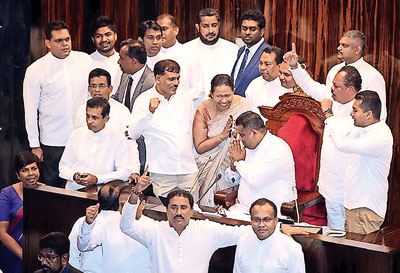Sunday Times 2
Trump’s strategies were similar to Hitler’s to seize power
Yankee bashers of Lanka and beyond its shores were delighted at the recent debacle that took place in America’s Capitol, regarded by some as the sacred temple of the world’s most powerful democracy.
 |
 |
| Assault on democracy in the US and Sri Lanka: Left: A Trump supporter seated on the chair of US House of Representative Speaker Nancy Pelosi during the Jan. 6 invasion of Capitol Hill; right: Sri Lankan lawmaker Arundika Fernando being cheered on by party colleagues as he sat on the Speaker’s Chair when parliament met amidst a constitutional crisis in 2018 |
“Now which country is a Banana Republic — theirs or ours?” asked a fiery nationalist with a wry smile.
The storming of the Capitol does not give us a feeling of euphoria — the Yanks getting a taste of their own medicine — but a feeling of having gone through such experience in Sri Lanka — a sense of Déjà vu — as the French say.
Didn’t we have our MPs including a monk performing boxing and wrestling bouts in the well of the chamber on many occasions and of course the grand finale when the president sacked his incumbent prime minister? Memories of grenades being hurled into a Committee Room on August 18, 1987 killing an MP and an official cannot be erased from our political memory.
At the time of writing, President Donald Trump has been impeached by the House of Representatives and the issue will be taken up by the Senate which can convict the president on the charge of promoting an insurrection. If approved by the Senate, the move can bar him from contesting for presidency again among many other impositions.
We will leave it to the pundits to predict what the future holds for the enigmatic Trump and instead attempt to make hypothetical projection on what he could have possibly turned out to be had he been successful in his attempt to be declared the president though losing the presidential election.
Trump didn’t care much about the constitutional proprieties, conventions or even some of the basic provisions of the American constitution. In his second term, could he have been able to challenge the validity of major constitutional restraints and do his own thing as he attempted in his first term as president? And when his second term ended, could he have done away with the two- term limitation of presidency and go in for popular support to continue as president just as he attempted to do after losing the last presidential election? He has the support of millions of voters, he could claim.
Suppose he could have managed all that and ruled in accordance with the normal laws of the country, what would he turn out to be: A benign dictator, ruling in accord with the normal law but doing things when he so desired to his whim and fancy — throwing out or executing those who oppose him? The President will not be subject to the normal laws of the land.
A perusal of the history of dictators shows ‘that the concept of a ‘Benign Dictator’ is a myth. History shows that under narcissistic, immoral and delusions of divinity, they inveigle the masses to believe in them. In simple terms they become demagogues — ‘those who preach beliefs they know to be untrue to masses who they know are idiots ’.
‘Benign dictators’ grasp power with popular slogans. Hitler’s Mein Kampf provides examples of how it could be done and how he accomplished it later. Gullible masses, if told that the existence of the nation is threatened by enemies — local and foreign — and danger is imminent, lap it up. The solution he provided was: One People, One Empire, One Leader (Ein Volk, ein Reich, ein Fuhrer) to save the nation and the German masses swallowed the bait.
Many dictators — of vast countries as well as potty little ones — have adopted this strategy of Adolf Hitler to seize power.
Western scholars are now comparing the strategies of Adolf Hitler and those adopted by Donald Trump in his quest to become the American president and also to have a second term of presidency.
Eric Chernoworth, co- director of the Institute for Democracy in Eastern Europe in his web (June 20, 2020) has written an analysis under the heading: ‘Can it happen here? Donald Trump and the Fracturing of America’s Constitutional Order’.
He says that while the Trump presidency is certainly not the emergent Third Reich of Adolf Hitler, events keep giving resonance to the warnings about ‘Trumps rise to power, response to national protests and unrest over brutal police violence against African Americans. Trump had peaceful demonstrators in front of White House attacked and ordered the military to ‘expand battle space to US soil’.
Chenoweth points out that several recent histories of Weimar Germany and Hitler’s rise to power, make analogies to that of Donald Trump more credible and even acute. Considering the prospect of a Trump re-election, their insights point to an alarming danger that too many dismiss.
It is pointed out that both Hitler and Trump were not taken seriously at the start of their careers. Hitler and his colleagues were taken as clowns after their failed Beer Hall Putsch. Trump, too, was considered a clown at the beginning of his quest for power. His politics were considered as being on the ‘fringe’ by contenders for Republican Party nominations.
A main prong of Hitler’s political ideology was racism – anti-Semitism. Trump, too, ‘built political support on a racist conspiracy theory of ‘birthism’.
It will be recalled that that it was Trump who raised the issue of Barack Obama’s birth certificate, contending that Obama was not born in the United States. Trump stepped up his racist themes, promoting anti-migration policies and anti-Globalisation policies on national platform under the banner ‘Make America Great Again’.
A salient comparison made by Chenoweth to the rise of Hitler and Trump is the use of the ‘Lie’ for political purposes. He says Trump lied all the time — a practice compounded by ‘media trumpets and enablers in the Republican Party.
Some of the other parallels drawn are: Trump’s reliance on ‘myths of national betrayal and decline to pursue political power; use of media forms to dominate news and politics; subordination of a national party to a dominant leader asserting the sole capacity to save the nation.
‘It is striking how many similarities one can identify while these aspects of Trump’s political playbook are usually defined as generic populism, it is their specific similarity to Germany’s actual example that resounds, the writer says.
(The writer is a former editor of The Sunday Island, The Island and former consultant editor of the Sunday Leader)

